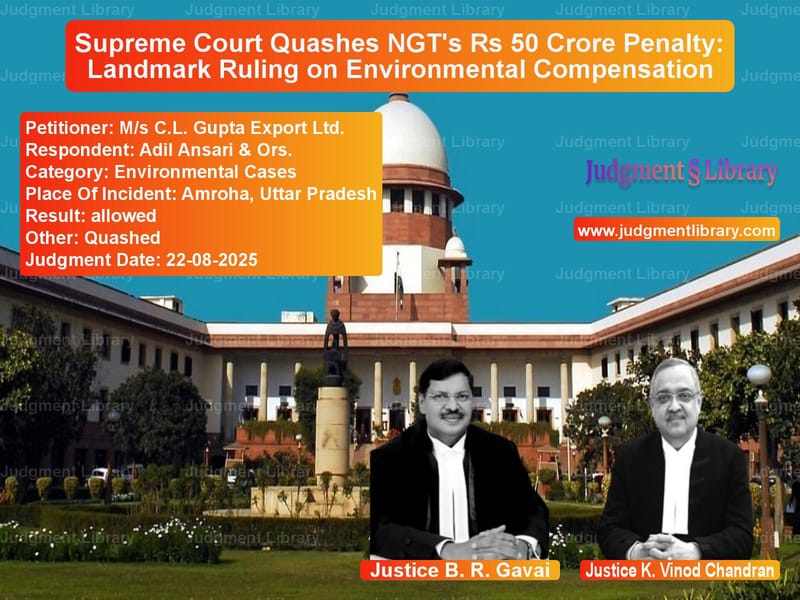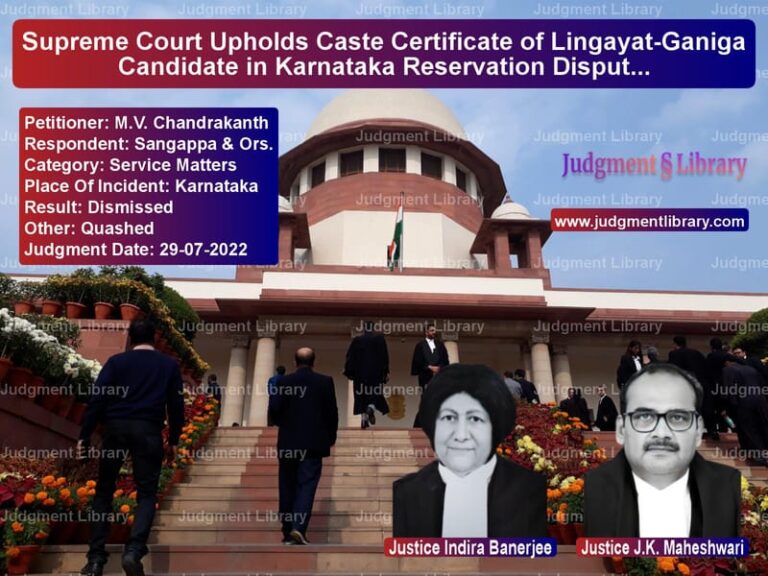Supreme Court Quashes NGT’s Rs 50 Crore Penalty: Landmark Ruling on Environmental Compensation
In a significant judgment that clarifies the boundaries of environmental jurisprudence in India, the Supreme Court has delivered a landmark ruling setting aside a massive Rs 50 crore penalty imposed by the National Green Tribunal on an exporting company. The case, which involved complex questions about the ‘polluter pays’ principle, the jurisdiction of environmental tribunals, and the proper calculation of environmental compensation, represents a crucial moment in India’s ongoing effort to balance industrial development with environmental protection. The Court’s decision emphasizes that even in environmental matters, the rule of law must prevail, and penalties cannot be arbitrarily imposed without proper legal basis.
The Case Background
The legal battle began when respondent Adil Ansari filed a public interest litigation before the National Green Tribunal alleging that M/s C.L. Gupta Export Ltd., an exporter of handicraft items employing around 7,000 workers, was actively perpetrating environmental degradation and pollution. The allegations were serious – the company was accused of extracting groundwater illegally and releasing effluents into a nearby river that ultimately flows into the Ganga. The petitioner also claimed that various government authorities including the Pollution Control Board, Central Ground Water Authority, and District Collector were mute spectators to these environmental violations.
The NGT Proceedings
The National Green Tribunal constituted a Joint Committee comprising representatives from the Central Pollution Control Board, Uttar Pradesh Pollution Control Board, and other authorities to investigate the allegations. Over a period of three years, multiple reports were filed that initially confirmed various environmental violations including ineffective effluent treatment, improper storage of hazardous wastes, and operations without proper consent. Based on these findings, the statutory authorities initially imposed environmental compensation of approximately Rs 2.49 crores using the CPCB’s established methodology. The company deposited Rs 1.16 crores after some waiver was granted. Crucially, in July 2021, the Joint Committee submitted a report confirming full compliance with all environmental norms and prior recommendations. Despite this clean chit, the NGT proceeded to impose a staggering Rs 50 crore penalty based on the company’s turnover and issued directions for the Enforcement Directorate to investigate possible money laundering violations.
The Supreme Court Hearing
Before the Supreme Court, the appellant company, represented by Sh. Vikas Singh, made several compelling arguments. The learned Counsel pointed out that “the environmental compensation as determined by the statutory bodies were paid up by the appellant. The appellant also had brought about all the mitigating measures, eventually leading to a report of complete compliance of the statutory conditions and the terms imposed by the Pollution Control Board.” He argued that despite the final compliance report, the NGT imposed compensation based on admitted turnover without any rational nexus, a approach deprecated by this Court in Benzo Chem Industrial (P) Ltd. v. Arvind Manohar Mahajan. The direction to the Enforcement Directorate was also challenged based on the precedent in Waris Chemicals (P) Ltd. v. U.P. Pollution Control Board.
On the other side, Mr. Saurabh Mishra, appearing for the Pollution Control Board, supported the NGT’s approach, arguing that “the NGT was within its power in enhancing the penalty since it is a deterrent measure.” He suggested that calibration of penalty could use multipliers under CPCB methodology rather than flat turnover percentage and sought upholding of structural directions in the NGT judgment.
The Supreme Court’s Reasoning on Penalty
The Supreme Court found serious flaws in the NGT’s approach after compliance was achieved. Regarding the massive Rs 50 crore penalty, the Court drew heavily from its recent judgment in Benzo Chem case, noting that “generation of revenue, or its quantum, would have no nexus with the amount of penalty to be ascertained for environmental damages. The methodology adopted by the NGT for imposition of penalty was held to be totally unknown to any principle of law.” The Court added a powerful observation: “We fully agree with the observation and add that rule of law does not permit State or its agencies to extract a ‘pound of flesh’, even in environmental matters.” The Court emphasized that if the NGT found the originally imposed compensation inadequate, it should have referred to the established CPCB methodology rather than arbitrarily looking at revenue generation.
Jurisdiction and Enforcement Directorate Direction
On the direction to the Enforcement Directorate, the Court followed its reasoning in Waris Chemicals case, noting that “Section 3 of the PMLA is dependent on illegal gain of property as a result of the criminal activity relating to a scheduled offence.” Since no FIR was registered for any scheduled offence and no complaint was filed alleging offences under environmental statutes scheduled under PMLA, the direction was without legal basis. More fundamentally, the Court questioned the NGT’s jurisdiction to issue such directions, observing that “the NGT should act within the contours of the powers conferred on it which is Section 15 of the NGT Act of 2010.” While such power might be available to courts constituted under PMLA or constitutional courts, it wasn’t available to the NGT, which was constituted for different purposes.
The Court’s Final Ruling and Observations
The Supreme Court allowed the appeal and set aside the NGT’s order imposing Rs 50 crore compensation and referring the matter to the Enforcement Directorate. However, the Court upheld the directions related to continuous monitoring and audit of pollution control measures, noting that “recycling of treated water, reduced usage of ground water withdrawal, continuous and robust monitoring would definitely guide the design of a prospective compliance regime.” The Court also set aside the sweeping direction for closure of the company’s divisions, reserving the right of jurisdictional PCBs to take action against any future violations.
In a significant concluding observation, the Court expressed concern about the NGT’s approach, noting that “application of mind is not proportionate to the number of pages.” The Court observed that despite the final compliance report, the NGT engaged in “an exercise in futility” and emphasized that “judicious consideration is the sum and substance of adjudication and the Courts/Tribunals should restrain themselves from engaging in mere rhetoric by stating the law in general without particular reference to the facts.”
Broader Implications
This judgment has far-reaching implications for environmental governance in India. While reaffirming the importance of the ‘polluter pays’ principle, it establishes crucial boundaries on how environmental compensation should be calculated. The ruling makes it clear that turnover-based penalties without established nexus to environmental damage are legally untenable. It also clarifies the jurisdictional limits of the National Green Tribunal, particularly regarding its power to initiate proceedings under other statutes like the Prevention of Money Laundering Act. Most importantly, the judgment reinforces that environmental protection must be pursued within the framework of established legal principles, and that tribunals cannot exercise powers beyond what their constituting statutes provide. The decision strikes a careful balance – ensuring that industries comply with environmental norms while protecting them from arbitrary and excessive penalties that could undermine economic activity and employment.
Petitioner Name: M/s C.L. Gupta Export Ltd..Respondent Name: Adil Ansari & Ors..Judgment By: Justice B. R. Gavai, Justice K. Vinod Chandran.Place Of Incident: Amroha, Uttar Pradesh.Judgment Date: 22-08-2025.Result: allowed.
Don’t miss out on the full details! Download the complete judgment in PDF format below and gain valuable insights instantly!
Download Judgment: ms-c.l.-gupta-expor-vs-adil-ansari-&-ors.-supreme-court-of-india-judgment-dated-22-08-2025.pdf
Directly Download Judgment: Directly download this Judgment
See all petitions in Environmental Cases
See all petitions in Judgment by B R Gavai
See all petitions in Judgment by K. Vinod Chandran
See all petitions in allowed
See all petitions in Quashed
See all petitions in supreme court of India judgments August 2025
See all petitions in 2025 judgments
See all posts in Environmental Cases Category
See all allowed petitions in Environmental Cases Category
See all Dismissed petitions in Environmental Cases Category
See all partially allowed petitions in Environmental Cases Category







